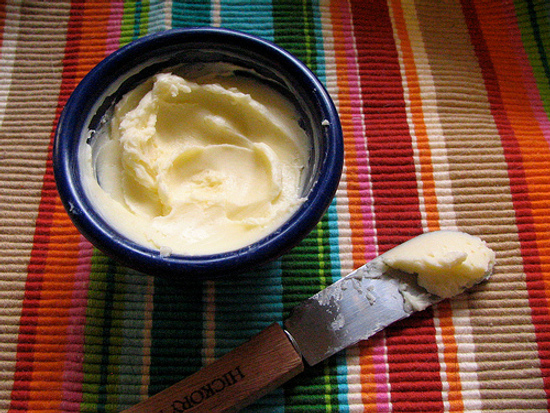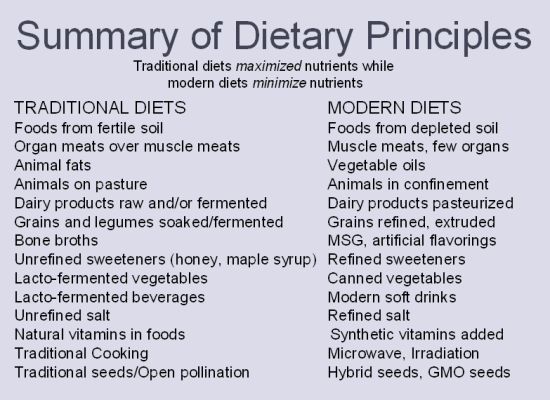
Somewhere deep down inside each of us, we know butter is good for us. It’s why we like to slather it on all sorts of tasty vegetables. Deep down, we like fats.
It’s why they’re so tempting. So tantalizing. It’s why they call our name.
Imagine a world where people ate fat — lots of fat. Mostly from wild or pasture-raised animals or tropical oils. In your mind’s eye, are these people overweight slouches dying of heart disease?
I’ll tell you what I see. I see a world of fit, healthy, lean, and slightly-tanned people capable of almost any feat.
I’ll also tell you what I don’t see — heart disease, diabetes, mood disorders.
I’m watching Sally Fallon’s presentation of Mary Enig’s The Oiling of America. It’s all about fats and the fallacies of the Lipid Hypothesis and goes into far greater detail than the video tutorial on fats I created for you guys last month.
Anyhow, the last slide of the presentation offered a fairly succinct summary of dietary principles.
I’d never seen a comparison of traditional diets to modern diets presented side-by-side before. The way the visual “clicked” inside my head inspired me to share it with you.
Hope you find it equally as helpful!

And there you have it — a handy little summary you can show people when they ask you why you eat the way you do.
And if you don’t eat a Traditional Diet already, what’s stopping you?
If you need a gentle nudge in the right direction or don’t know where to start, check out my ever-growing list of Newbie Tips.
Now, I know that we’re all made differently and have different goals in mind when we make these sorts of lifestyle/dietary changes. Even within a Traditional, Real Foods model, the variations of exactly what each of us should eat and why seem endless. One diet does not fit all.
Some of us need physical healing. Some of us need to lose weight. Still others are suffering from mental or nervous system issues. Some of us simply want to be as healthy as we can be. If you’re looking for guidance in any of these areas, I am a nutrition & wellness coach. I’m here to help.
(photo by litlnemo)
 |
















Very nice. Concise and compelling! I would add clean water vs. chlorinated, fluoridated water. Of course, “clean” is very hard to come by these days!
Local Nourishment
Great post!
I’ve seen Sally do The Oiling of America and it’s awesome. Such mind-blowing information.
Thanks for posting that slide — I love how succinct it is.
Cheeseslave
A world where people eat all kinds of fats (not those freak of science trans fats of course)? Welcome to MY world! Yay
The SoG
Son of Grok
Local Nourishment — I know! That’s one thing we haven’t yet “fixed” in my home. All our water still comes from the tap. I’m really counting on that kombucha to do some serious detoxing for us!
Ann Marie — I also love how succinct it is. Seeing it side by side made everything click.
SoG — Mine too!
Definitely a fantastic summary of what’s right… and what’s wrong!
KristenM — Did you make your own Kombucha?? Am interested!
(a friend of mine made some last winter and gave us a batch, but I never followed through)
lo
lo — I always brew my own kombucha! Who would pay $3.50/serving per day? YIKES. I make my own for $1.50/gallon. I even posted a tutorial about it here:
https://www.foodrenegade.com/2009/02/06/how-to-brew-kombucha-double-fermentation-method/
Oh yes, after seeing Sally speak recently at my school I started eating more butter. Organic butter! And I have to say, my dry skin patches have cleared up and wrinkles developing on my forehead smoothed over. I don’t try to eat a low-fat diet but I guess cooking at home using minimal animal products has made it so. Now I’m putting butter in my grains every morning. It’s one of the more delicious health decisions I’ve made 🙂
Michelle
Kristen, what did you think of the latest study showing red meat will shorten your life?
Ed Bruske
Ed — A couple of things. First, it’s simply an observational study which (at best) describes a correlation between eating red meat and shorter life spans. But it’s not the equivalent of a randomized, double-blind, placebo based scientific trial which actually *proves* something. Second, it’s not being tested on grass-fed/finished/wild red meats.
What does that mean for me? I don’t have a problem believing that eating conventionally-raised meat from our industrialized agricultural system is bad for someone’s health. In fact, I find it easy to believe that. That meat has a terrible balance of Omega 6 to Omega 3 fats (21:1) when compared to grass-fed/finished meats (1:1). We know that anything over 4:1 greatly increases risk of developing chronic disease. That meat is also without CLA, a heart-disease fighting fatty acid that’s abundant in wild/grass-fed/pastured meats.
So, even if it turned out that they took this hypothesis and somehow PROVED it in a real scientific study, I *still* wouldn’t have a problem consuming read meat from good sources.
Did that answer your question?
We’re trying to be diligent with the quality of our food especially for our adopted 2 year old boy’s sake. We’ve tried very hard to foster good eating habits from the very start. He’s rarely had white bread. He prefers sweet potatoes over white. He likes tomatoes and peas, but his veggie variety still needs some work. He loves fish! He’s big on dairy – even loves sour cream (which I just can’t stand).
Having come from an orphanage, he was rarely exposed to sugary sweets and we’ve worked hard to keep it that way. In fact, he has exhibited some pretty scary & radical behavioral swings when he has had the rare sweets like at birthday parties or such, so we purposefully limit those kinds of nutritionally-void, sugar-laden foods.
We’ve been loosely adhering to a low-carb way of eating, substituting high-fiber, high-protein foods wherever & whenever possible. We only use real butter – in fact I prefer the “European” style butter at my local grocery store that’s organic and has a bit higher fat content (and therefore melts easier at lower temps). Mostly for our toddler son’s sake, we use whole milk (otherwise my wife & I use very little milk) and buy whole milk cheeses. We go with organic dairy as often as possible.
Rob O.
Great food for thought (as it were)! As the mother of four I really enjoy finding posts such as this that break it down Barney style for me.
I’m happy to have stumbled across the blog!
Lara